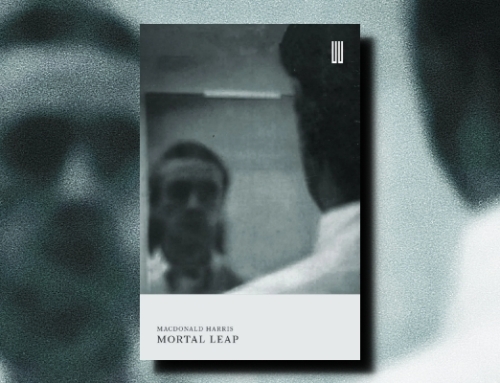Satantango
by László Krasznahorkai (1985)
translated from the Hungarian by George Szirtes (2012)
New Directions (2012)
288 pp

Satantango is Krasznahorkai’s debut novel, famously (in some circles) made into a 7-hour movie by Hungarian auteur Bela Tarr. It’s dank, isolating, mad, hopeless — I enjoyed it so much I read it twice for this review. It’s somehow all of those things as well as exhilarating. I used this phrase to describe Krasznahorkai’s Animalinside and it works just as well here: it’s a beautiful nightmare. It could be about the end of the world, but that’s not quite right. In this world, the end would be redundant.
The structure of Satantango mimics a tango, which takes six steps forward and then six steps back, essentially taking us right back where we began. No progress has been made. Its chapters count from 1 to 6 and then from 6 to 1. It’s a Rorschach test, in which we dig into the characters’ psyches, blur their perspectives of events, see into ourselves. Or, perhaps even more aptly, a Möbius strip, as K. Thomas Kahn describes it in the Los Angeles Review of Books (here), the final chapter being “The Circle Closes,” though that chapter title is a bit misleading — the circle both closes and begins again.
The book begins with a depressing description of a mucky, failed collective farm in Hungary.
One morning near the end of October not long before the first drops of the mercilessly long autumn rains began to fall on the cracked and saline soil on the western side of the estate (later the stinking yellow sea of mud would render the footpaths impassable and put the town too beyond reach) Futaki woke to hear bells.
Futaki is one of the few remaining residents of this estate, abandoned and forgotten. They’re free from whatever oppression they suffered while the estate was running. They’re free to leave — and Futaki has been planning to leave “any day now.” This freedom, though, is paralyzing. Late in the novel, Futaki realizes that “now he was subject to — in fact being exploited by — mere chance.” These bells of inexplicable origin (there is no church for miles), frighten Futaki. Are they part of a dream? Worse, though, is when they stop, in the “threatening silence that followed: anything might happen now, he felt.”
In this first chapter we are introduced to the schemes these residents commit against each other. Futaki is sleeping with Mrs. Schmidt. Mr. Schmidt is stealing money, a plot Futaki is part of, only Mr. Schmidt is planning to cheat Futaki. But all of this changes when they get the good news that two people, once thought dead, are returning.
Along with the others, Futaki’s demeanor changes completely: “Don’t go regretting anything, old man! You’ll see. It’ll be cushy for us. Pure gold. A real golden age!” It’s with such promise that the second chapter, “We Are Resurrected,” begins. The saviors are two men, Irimiás and his sidekick Petrina. We meet them while they are being held in a police station, hatching schemes of their own: “We’ll take their money then we’ll move on.”
From the outline above, I hope to show that this is not an overly complicated book in terms of narrative. In each chapter we meet a few new characters, but for the most part they are all beginning their trek to the bar, where, they are told, Irimiás and Petrina will arrive that night. It’s also rather easy to hold on to some predominant themes (hope, despair, doom) and some overt symbols (death, resurrection, bells). Indeed, relative to Krasznahorkai’s later work, like The Melancholy of Resistance (my review here) and Animalinside (my review here), Satantango is accessible.
But this accessibility, like hope, is deceptive. The proliferation of symbols and meaning clear away and we sense — even if we do not see — something deeper and more terrible. Perhaps better than Bolaño himself, Krasznahorkai shows us that just when we think things are coming together to form some meaning, we get a terrifying intimation of meaninglessness. That is the prowling menace, going around and around, over and under this Möbius strip.
Irimiás does arrive, and he speaks to the people, using a recent death — was the death “for us or because of us” — as a rallying point to take the people through the “painful process of liberation.” But for what? As in Animalinside, this is a world on the brink of destruction — not just physical destruction (that’s basically already happened) but complete annihilation. The worst part of it is this annihilation begins inside the characters. Language breaks down:
[. . .] Mrs. Schmidt was a bird happily flying through the milk of theclouds seeing someonedownthere wavingather soshedes cendeda littleand could hear Mrs.Schmidtbawling whyisntshecooking youscoundrelcomedownim mediatelybutshe flewoeverher andshechir ruppedyou won’tdieofhunggerbeforetommorrow [. . .]
The characters are able to witness this, asking what is the significance? And that is their terrifying answer.
Our father . . . um, our father
which art there, art, art in the sky, er,
in heaven, let us praise, er . . . hallowed be
our lord Jesus Christ,
no . . . let them praise . . . no, let us praise
rather, let them praise Your name,
and give us this . . . what I mean is,
let everything be according to, er,
whatever you want . . . in earth as
it is on earth . . . in heaven . . .
or in hell, amen . . .
Satantango is a finalist for the Best Translated Book Award. It is my choice to win. Szirtes worked on it for ten years, and it’s an achievement we should honor.









Well, your review makes the book sound so appealing that I want to jump right in to it, except that I should go to bed. So, tomorrow. I have had it for a year, waiting for the right moment, I guess. I don’t know. No one knows.
It will probably not surprise you if I mention that War & War is also quite something. A horrible nightmare, among other things.
I do the waiting game with books too, Tom. I can never understand why. Are we afraid we won’t like it? Are we savoring it?
I still need to read War & War. I have had it for three years, but I’m . . . you know : ).
great review trevor I felt this was great intro to him for me and will now thry the other ones by him ,all the best stu
Glad you liked it Trevor. This was my book of the year for 2012, and topped my end of year roundup post for that year accordingly. It’s an absolute masterpiee, an extraordinary vision.
Since you, me, and as I recall Stu in his review, all loved it I thought it might be interesting to link to Kevin of kevinfromcanada’s review as a counterpoint as he was less taken than we were. His review is here: http://kevinfromcanada.wordpress.com/2013/03/21/satantango-by-laszlo-krasznahorkai/
Nice review by the way, I liked the point on language breaking down and this is a great line which is spot on: ” It could be about the end of the world, but that’s not quite right. In this world, the end would be redundant.”
I finished this a few days ago, and I’m now even more surprised that the IFFP panel saw fit to leave it off the shortlist. It’s not perfect, and I had a few issues with it (including some horribly Americanised dialogue near the start!), but still…
Tony, could you identify some examples. I do not think I recognized any dialogue as “American,” but I could just be deaf to it. In a number of other places the vocabulary has clearly been drawn from British English, which is logical given the translator. It would be strange if Szirtes mangled the dialogue. Perhaps he is trying to reproduce something in the Hungarian – dialect, maybe.
In my review (to be posted tomorrow, my time), I have written ‘buddy’, ‘pal’, ‘asshole’, ‘sonofabitch’, and ‘dumb ass’. There were many more, but these were the ones I chose to use in my review.
I agree though that there were also some aspects of the text which were more reflective of British English, and this may be part of a wider trend, a move towards a global English in translation (as discussed by Morgan at All Wrongs Reversed yesterday):
http://all-wrongs-reversed.net/2013/04/29/you-aint-from-around-here-translation-globish-my-heart-and-the-real-world/
Of course, that may well lead to translations being written in a language nobody really speaks…
We should ask @george_szirtes on Twitter what he was trying to do.
For anyone interested, my review is also out now :)
http://tonysreadinglist.blogspot.com.au/2013/05/satantango-by-laszlo-krasznahorkai.html
[…] Upon Stone was my choice last year — seriously, this is an award worth watching!). Here are my thoughts, and congrats to […]
Thank you for bringing this very interesting book to our attention. On your recommendation, I bought and read Satantango. I thought it was really quite marvelous, if a bit dark–both literally and thematically. I would differ, however, on the ending, which I thought detracted from my enjoyment as it felt like a facile modernist gimmick. Perhaps in saying this I’m making something of a “recency error”, so to speak: maybe in 1985, when the book was published, this sort of literary ourobouros was less commonplace.
I love this book, Dan, so I’m thrilled to have it brought back to my attention by your enjoyment!
As for the ending, I might agree, actually, though the remainder of the book is so strong, the ending could have been almost anything and I would have been okay with it. I do think it works well here, though, as a kind of vicious circle. Your point on the “recency error” is also interesting and probably is right to a degree. The more authors go with trickery the more it feels like gimmickry, but Joyce did something similar back with Finnegans Wake (the namesake of this blog!).